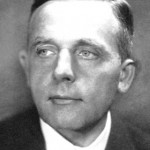 In 1931 Otto Warburg, a German physiologist and physician, conducted an important study on cancer cells that is helping scientists today to understand the effects of cancer on the human body. Warburg was one of the century’s leading biochemists and was won the Nobel Prize in 1931 for his work.
In 1931 Otto Warburg, a German physiologist and physician, conducted an important study on cancer cells that is helping scientists today to understand the effects of cancer on the human body. Warburg was one of the century’s leading biochemists and was won the Nobel Prize in 1931 for his work.
Warburg discovered the main biochemical cause of cancer, or what distinguishes a cancer cell from a normal, healthy cell, which was that cancer metabolizes much differently than normal cells. Normal cells require oxygen and cancer cells do not thrive with oxygen. In fact, cancer cells metabolize through a process of fermentation which requires sugar. Cancer cells have a metabolism that is about 8 times greater than that of the metabolism of normal cells, hence the cells divide and grow much faster. This discovery, called the Warburg Effect, is one of the primary factors used in position emission testing, or PET imaging studies.
To read the entire article click here.







